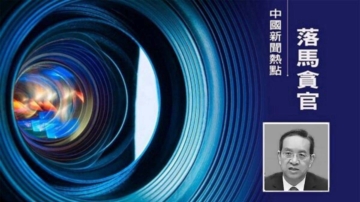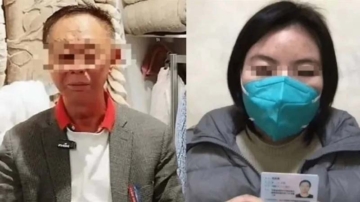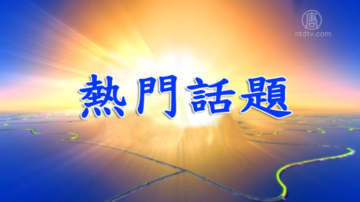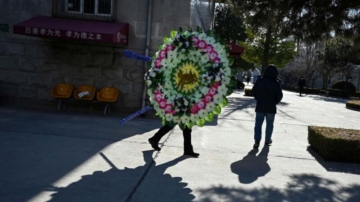【新唐人2013年05月22日讯】在大陆被称为政坛“黑马”的陆昊,今年3月,从团中央空降黑龙江,任黑龙江省代省长,成为目前大陆最年轻的省府首长。有媒体曝光,早在1985年,18岁的陆昊就在中南海喊出“不做改革旁观者”。那么,中共启用这些具备改革意识的人士,是试图改革了吗?
3月25号,黑龙江政府网发布消息,决定任命陆昊为黑龙江省副省长、和代理省长。
陆昊1967年出生于西安,高中时候已经加入了中共党员。1985年,陆昊被保送进入“北京大学”的经济管理学院,进校不到两年,通过直选成为北大学生会主席。据大陆官媒报导,陆昊是当时西安唯一的中学生党员﹔也是“文革”后,“北大”第一位经直选产生的学生会主席。
2003年1月,35岁的陆昊当选为北京市副市长,成为当时北京市最年轻的副市长﹔2008年5月,时年41岁的陆昊接任共青团中央书记处第一书记,成为最年轻的正部级官员。目前他是大陆最年轻的省长。
时事评论员司马泰:“不管他启用甚么样的人,(陆昊)67年(出生),也是45、6岁了,也不算年轻了。其实也谈不上多大的突破。就是正常他要维护他的一代、二代、三代的接班人,所以他要栽培、要提拔,准备这么一个梯队。”
报导说,1985年11月,在中南海怀仁堂,陆昊作为学生代表,出席中共中央顾问委员会召开的一次座谈会,陆昊发言说,“改革是艰难的创举,不可避免会出现这样或那样的问题,但我们不能因此而停步不前。我们大学生不能做改革的旁观者。”
但是,近年来,中国社会矛盾突出,陆昊的这种自觉,还能在他的从政路上运行﹖中共新领导人习近平启用这些所谓的改革派人物,能缓解国内的冲突吗﹖
时事评论员司马泰认为,新官上任都急于高谈所谓的改革,这似乎已经成为拯救共产党的一个招牌了。
时事评论员司马泰:“你不管他改甚么,他觉得改革的这个旗号他必须打的,他不管是在舆论上,或者是在人事安排上,都要给人这种感觉 ,为甚么呢﹖因为大家都知道共产党已经大家都不信他了,共产党它要想存活下来,一定要把自己扛上改革的大旗,来愚弄糊弄老百姓,糊弄这个世界,给人们制造这种幻想。”
3月13号晚上,习近平在政治局扩大会议上列出了“三条”措施,包括“三公”消费公开公示,和财产经济收入申报公开公示,以及解决就业问题、以法治国等。香港《争鸣》杂志认为,习近平希望民众能看到实效。
据了解,陆昊是现任总理李克强、和国家副主席李源潮的师弟,他们都是经济学家厉以甯的学生。
时事评论员林子旭表示,北大、清华的这批学生,视野比以前的领导人开阔,他们或许表面上碍于中共的淫威,显得乖巧,但是,林子旭说,真有个风吹草动,这些人很有可能成为反共的急先锋。
时事评论员林子旭:“相信中共也非常明白这一点,但是中共也是没有办法。老一些的已经不能用了﹔像奴才一样听话的,往往又都是一些废物。中共也只能是走一步看一步了。”
林子旭还指出,到了今天,中共一方面需要那些邪恶、阴狠的人为自己充实能量,另一方面又需要一些有能力、有思想的人控制局面,但是这两类人又很难走到一起。因此,林子旭说,类似团派或江派这样的权斗会一直存在下去,而这种权斗带来的巨大消耗,必然会让中共更快的崩盘。
采访编辑/常春 后制/薛莉
Heilongjiang Acting Governor: “Don't Be a Reform Bystander”
Lu Hao—the “dark horse” in the mainland political arena—
took the position of acting governor of Heilongjiang Province
this March, after working at the Communist Youth League
(CYL) Central Committee.
Lu Hao is the youngest head of a provincial government
in mainland China.
Media have quoted Lu Hao as saying in Zhongnanhai in 1985:
“Do not be a reform bystander”—he was then 18 years old.
The Chinese Communist Party (CCP) uses
such reform-minded people for their own means.
Is this a signal of reform from the CCP?
—Let's take a look.
On March 25, Heilongjiang's government announced
that Lu Hao had been appointed as the vice governor and acting governor of its province.
Lu was born in 1967 in Xi'an, and joined the CCP
when he was a high school student.
In 1985, Lu Hao was recommend for admission
to the Department of Economics and Management
at Beijing University, and after two years, he became the Students' Union (SU) President through direct elections.
Mainland China's official media reports that, Lu Hao was
the only high school student among Xian's CCP members.
He was also the first SU President at Beijing University
who had taken the position through direct elections, since the Cultural Revolution.
In January 2003, Lu Hao became the Vice Mayor of Beijing
at 35 years old: the youngest in history.
In May 2008, Lu Hao took over as the first secretary
of the CYL Central Committee at age 41, becoming
the youngest ministerial-level official at that time,
and now he is the youngest Governor in mainland China.
[Sima Tai, Commentator]: “No matter what kind of person
the CCP appointed, Lu Hao was born in 1967 and
he is 45 years old; not young
—there's not much breakthrough.”
“In fact, the CCP wants to maintain the
second generation of successors, and
this is why they cultured, promoted
and prepared for such an echelon.”
Reports say that Lu Hao had attended a seminar held by
the Advisory Committee of the CCP Central Committee
in the Huairen Hall in Beijing's Zhongnanhai
in November 1985, as a student representative.
Lu Hao had said in the seminar:
“Reform is a type of initiative; it is very difficult.”
“There will be many problems during the reform;
however, we shouldn't stop and we—university students—
are not reform bystanders.”
Many prominent social contradictions have appeared
in China over recent years—in this environment,
can Lu Hao put his ideas into practice in his political career?
Can the reformist figures appointed by the CCP's new leader,
Xi Jinping, ease domestic conflict?
Commentator Sima Tai says, officials are eager to talk about
so-called reform, but it seems to be done to save the CCP.
[Sima Tai]: “No matter what's going to be changed,
the CCP has to play the banner of reform,
whether it's with public opinions
or with personnel arrangements.
It has to give people the feeling of reform—Why?
As we all know, the CCP understands that nobody believes it.
But it wants to survive, so it has to play 'reform' itself; that is,
create an illusion of reform to fool the public and the world.”
March 13th, evening, Xi Jinping listed the “three measures”
in the enlarged meeting of the Political Bureau,
including the publicity of government consumption;
the declaration and publicity of property income;
the employment problem; and the rule of law, etc.
Hong Kong's Contention Magazine says, Xi Jinping
wants people to see the effectiveness of the 'reform'.
It's known that Lu Hao was a schoolmate of the current
Prime Minister Li Keqiang and Vice-President Li Lu Hao
in junior school, and that all three had been taught by
the economist Li Yining.
Commentator Lin Zixu says, this group of students
from Beijing University and Tsinghua University have
a more open view compared to the previous CCP leaders.
Lin says, they may be well-behaved on the surface
because of the CCP's despotic power, but they're likely to
become the vanguard of anti-communism
when there's sign of real trouble with the CCP.
[Lin Zixu, Commentator]: “I believe that the CCP is also
well aware of this situation but it has no solutions;
the older officials can't be used and the lackeys are tractable
but are wastes—so the CCP can only take things step by step.”
Lin Zixu adds that, currently, the CCP needs those evil people
on one hand, to enrich their own energy; on the other hand,
it needs some thoughtful people to control the situation,
yet these two types of people can hardly come together.
Therefore, the power struggle between the CYL faction
and Jiang's faction, or similar ones will always exist, Lin says
And these power struggles will bring such enormous
internal friction, that it will accelerate the CCP's downfall.
3月25号,黑龙江政府网发布消息,决定任命陆昊为黑龙江省副省长、和代理省长。
陆昊1967年出生于西安,高中时候已经加入了中共党员。1985年,陆昊被保送进入“北京大学”的经济管理学院,进校不到两年,通过直选成为北大学生会主席。据大陆官媒报导,陆昊是当时西安唯一的中学生党员﹔也是“文革”后,“北大”第一位经直选产生的学生会主席。
2003年1月,35岁的陆昊当选为北京市副市长,成为当时北京市最年轻的副市长﹔2008年5月,时年41岁的陆昊接任共青团中央书记处第一书记,成为最年轻的正部级官员。目前他是大陆最年轻的省长。
时事评论员司马泰:“不管他启用甚么样的人,(陆昊)67年(出生),也是45、6岁了,也不算年轻了。其实也谈不上多大的突破。就是正常他要维护他的一代、二代、三代的接班人,所以他要栽培、要提拔,准备这么一个梯队。”
报导说,1985年11月,在中南海怀仁堂,陆昊作为学生代表,出席中共中央顾问委员会召开的一次座谈会,陆昊发言说,“改革是艰难的创举,不可避免会出现这样或那样的问题,但我们不能因此而停步不前。我们大学生不能做改革的旁观者。”
但是,近年来,中国社会矛盾突出,陆昊的这种自觉,还能在他的从政路上运行﹖中共新领导人习近平启用这些所谓的改革派人物,能缓解国内的冲突吗﹖
时事评论员司马泰认为,新官上任都急于高谈所谓的改革,这似乎已经成为拯救共产党的一个招牌了。
时事评论员司马泰:“你不管他改甚么,他觉得改革的这个旗号他必须打的,他不管是在舆论上,或者是在人事安排上,都要给人这种感觉 ,为甚么呢﹖因为大家都知道共产党已经大家都不信他了,共产党它要想存活下来,一定要把自己扛上改革的大旗,来愚弄糊弄老百姓,糊弄这个世界,给人们制造这种幻想。”
3月13号晚上,习近平在政治局扩大会议上列出了“三条”措施,包括“三公”消费公开公示,和财产经济收入申报公开公示,以及解决就业问题、以法治国等。香港《争鸣》杂志认为,习近平希望民众能看到实效。
据了解,陆昊是现任总理李克强、和国家副主席李源潮的师弟,他们都是经济学家厉以甯的学生。
时事评论员林子旭表示,北大、清华的这批学生,视野比以前的领导人开阔,他们或许表面上碍于中共的淫威,显得乖巧,但是,林子旭说,真有个风吹草动,这些人很有可能成为反共的急先锋。
时事评论员林子旭:“相信中共也非常明白这一点,但是中共也是没有办法。老一些的已经不能用了﹔像奴才一样听话的,往往又都是一些废物。中共也只能是走一步看一步了。”
林子旭还指出,到了今天,中共一方面需要那些邪恶、阴狠的人为自己充实能量,另一方面又需要一些有能力、有思想的人控制局面,但是这两类人又很难走到一起。因此,林子旭说,类似团派或江派这样的权斗会一直存在下去,而这种权斗带来的巨大消耗,必然会让中共更快的崩盘。
采访编辑/常春 后制/薛莉
Heilongjiang Acting Governor: “Don't Be a Reform Bystander”
Lu Hao—the “dark horse” in the mainland political arena—
took the position of acting governor of Heilongjiang Province
this March, after working at the Communist Youth League
(CYL) Central Committee.
Lu Hao is the youngest head of a provincial government
in mainland China.
Media have quoted Lu Hao as saying in Zhongnanhai in 1985:
“Do not be a reform bystander”—he was then 18 years old.
The Chinese Communist Party (CCP) uses
such reform-minded people for their own means.
Is this a signal of reform from the CCP?
—Let's take a look.
On March 25, Heilongjiang's government announced
that Lu Hao had been appointed as the vice governor and acting governor of its province.
Lu was born in 1967 in Xi'an, and joined the CCP
when he was a high school student.
In 1985, Lu Hao was recommend for admission
to the Department of Economics and Management
at Beijing University, and after two years, he became the Students' Union (SU) President through direct elections.
Mainland China's official media reports that, Lu Hao was
the only high school student among Xian's CCP members.
He was also the first SU President at Beijing University
who had taken the position through direct elections, since the Cultural Revolution.
In January 2003, Lu Hao became the Vice Mayor of Beijing
at 35 years old: the youngest in history.
In May 2008, Lu Hao took over as the first secretary
of the CYL Central Committee at age 41, becoming
the youngest ministerial-level official at that time,
and now he is the youngest Governor in mainland China.
[Sima Tai, Commentator]: “No matter what kind of person
the CCP appointed, Lu Hao was born in 1967 and
he is 45 years old; not young
—there's not much breakthrough.”
“In fact, the CCP wants to maintain the
second generation of successors, and
this is why they cultured, promoted
and prepared for such an echelon.”
Reports say that Lu Hao had attended a seminar held by
the Advisory Committee of the CCP Central Committee
in the Huairen Hall in Beijing's Zhongnanhai
in November 1985, as a student representative.
Lu Hao had said in the seminar:
“Reform is a type of initiative; it is very difficult.”
“There will be many problems during the reform;
however, we shouldn't stop and we—university students—
are not reform bystanders.”
Many prominent social contradictions have appeared
in China over recent years—in this environment,
can Lu Hao put his ideas into practice in his political career?
Can the reformist figures appointed by the CCP's new leader,
Xi Jinping, ease domestic conflict?
Commentator Sima Tai says, officials are eager to talk about
so-called reform, but it seems to be done to save the CCP.
[Sima Tai]: “No matter what's going to be changed,
the CCP has to play the banner of reform,
whether it's with public opinions
or with personnel arrangements.
It has to give people the feeling of reform—Why?
As we all know, the CCP understands that nobody believes it.
But it wants to survive, so it has to play 'reform' itself; that is,
create an illusion of reform to fool the public and the world.”
March 13th, evening, Xi Jinping listed the “three measures”
in the enlarged meeting of the Political Bureau,
including the publicity of government consumption;
the declaration and publicity of property income;
the employment problem; and the rule of law, etc.
Hong Kong's Contention Magazine says, Xi Jinping
wants people to see the effectiveness of the 'reform'.
It's known that Lu Hao was a schoolmate of the current
Prime Minister Li Keqiang and Vice-President Li Lu Hao
in junior school, and that all three had been taught by
the economist Li Yining.
Commentator Lin Zixu says, this group of students
from Beijing University and Tsinghua University have
a more open view compared to the previous CCP leaders.
Lin says, they may be well-behaved on the surface
because of the CCP's despotic power, but they're likely to
become the vanguard of anti-communism
when there's sign of real trouble with the CCP.
[Lin Zixu, Commentator]: “I believe that the CCP is also
well aware of this situation but it has no solutions;
the older officials can't be used and the lackeys are tractable
but are wastes—so the CCP can only take things step by step.”
Lin Zixu adds that, currently, the CCP needs those evil people
on one hand, to enrich their own energy; on the other hand,
it needs some thoughtful people to control the situation,
yet these two types of people can hardly come together.
Therefore, the power struggle between the CYL faction
and Jiang's faction, or similar ones will always exist, Lin says
And these power struggles will bring such enormous
internal friction, that it will accelerate the CCP's downfall.








